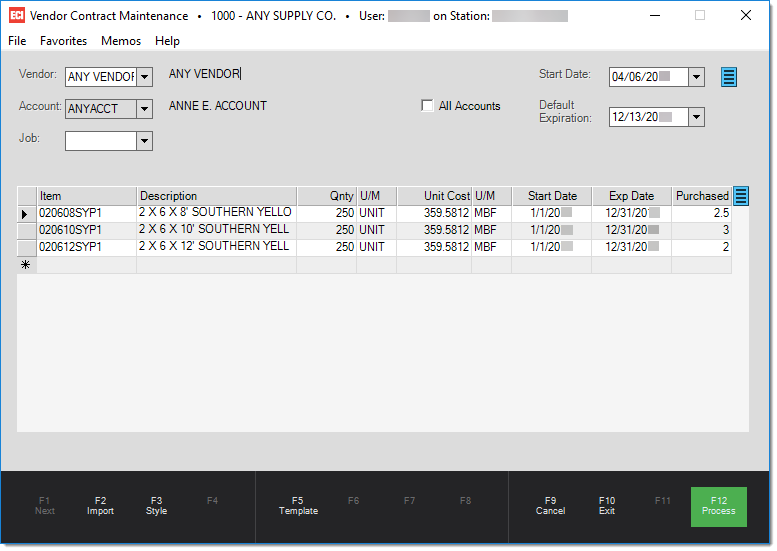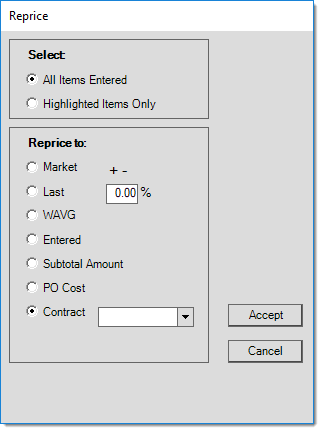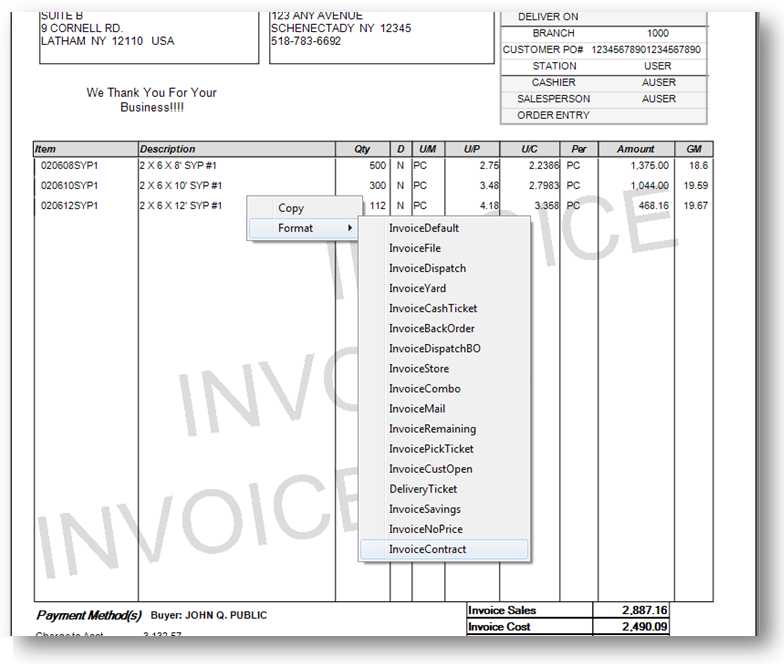Vendor Contract
Vendor Contracts are similar to the contract pricing used with customer accounts at Point of Sale; however, in the case of a vendor contract, you are referencing special cost pricing that a vendor is providing. This cost pricing may be for a limited time and/or quantity. Minimally, vendor Contracts involve a vendor, date range, and items. They may also optionally involve a customer.

Vendor Contracts may be optionally linked with a customer for cases when the purchase contract applies to a specific customer's purchase(s) only. For example, a customer needs a large number of widgets. Due to the large quantity, they are eligible for better cost pricing than would normally apply. In this case, linking the vendor contract to the account can be done so that the contract cost can be used for profit analysis in place of the usual average cost. Average cost is still used for cost updates at Point of Sale; however, a new document style may be optionally enabled in order to allow users to compare the margin using the contract cost instead. Again, this doesn't actually change how any totals or other information is updated, it's just available for reference on a document.
This additional document functionality is only available if a vendor contract has been linked to the customer and the "Enable PO Contract Style for POS" parameter has been set (Main Menu > Maintenance > Database > Parameters > Purchasing tab). This parameter determines whether contract cost information is saved with the invoice details. Accessing and saving this additional information requires additional Point of Sale processing and may potentially affect performance.
Start Date and Default Expiration
The two (2) date fields in the upper right-hand corner of the form are used for (a) setting the default date range used by the grid and (b) selection of any previous contract items. Default dates don't override the dates entered in the grid and different item rows can have different date ranges if you prefer. Existing contract data will only be displayed if the dates for the contract pricing also falls between the dates selected, however. If overlapping date ranges for the same contract item are specified, the first contract record found is used and any others are disregarded. Overlapping contracts for the same vendor and/or vendor-customer combinations are not suggested.
It's important to understand that the dates (in the grid) establish the contract period both for vendor purchases and also the customer (if the contract is linked to a specific customer). Once the contract period expires (or before it begins, if set for a future period), repricing by Contract in Order Entry (Purchasing) won't have any affect on cost pricing. In addition, any Point of Sale transactions after the contract expiration won't be linked with contract costs. When linking a contract to an account, it's important to include a period of time that considers when the customer will be making a purchase of the contract items. The need for contract dates to be applicable both to purchases and sales is one reason why contract pricing is not automatically applied during Purchasing (because the vendor's contract may have expired, but the customer may not yet have purchased the goods).
All Accounts
The "All Accounts" check box determines whether or not the contract costs are to be applied when ever contract pricing is selected or just when contract pricing is selected for a specific customer. Regardless of your choice, the Reprice (F7) function in Purchasing, Order Entry must always be used to apply the contract. Costs are never based on a vendor contract automatically. Contract pricing for a specific customer always overrides any contract price without a specific customer (account).
Vendor Contracts cannot be associated with an individual job for an account. When enabled for use with Point of Sale, the contract costs would be updated for all jobs when applicable.
Quantity Expiration vs. Date Only
Quantity is optional for each item specified and applies to purchasing only. Quantities greater than zero provide an upper cap on the quantity that will be allowed the contract price. Any orders placed once the quantity has been met or exceeded will no longer trigger the contract cost. When a zero quantity is specified, there is no limit on the contract quantity. Limitations are only placed on contract pricing until after the cap (quantity) has been exceeded. A single quantity that exceeds the cap would still allow contract pricing since at that time, the cap has not yet been met.
There is no quantity expiration for Point of Sale transactions involving a vendor contract. Only the contract dates are considered in this case.
Applying Contract Pricing to a Purchase Order
Contract pricing is not automatically applied during purchasing. To apply contract pricing, you must use the Reprice (F8) function in Order Entry (Main Menu > Purchasing) and choose the "Contract" radio button. A drop down selection for choosing an optional customer account is also provided in this case. If the purchase order's pricing needs to match a contract that is also linked to a specific customer account, the account should be selected by the user. When an account is designated, contract pricing for the account will be applied as well as any other "all accounts" contract pricing that is indicated for other items. If the same item is present on a specific account (customer) contract, but is also saved for the vendor with no account specified, the "account" contract price takes precedence and will be used. Customer linked pricing overrides any contract pricing that is saved for the vendor without a specified account when an account is indicated. If no customer's account is selected during the Reprice (F8), only contract pricing for the vendor that is not linked to a specific customer will be applied.

Once contract pricing has been applied, any affected items will be identified by green fore-coloring of the Unit Cost in the grid area. Color coding is only provided in Order Entry, not during receiving, etc.

When processing the purchase order, a task list message is provided to "remind" users if contract pricing was available for the vendor that was not indicated using the Reprice (F8) function. It is possible to modify the order and still apply contract pricing prior to receipt; however, the Reprice (F8), Contract function is only available from the Order Entry transaction (it is not available in Receipts).
The menu marker ![]() found to the right of the grid offers three (3) useful options:
found to the right of the grid offers three (3) useful options:
•Update Start Date - Updates all start dates in the grid to match the current start date (above).
•Update Expiration Date - Updates all expiration dates in the grid to match the current expiration date (above).
•Set All Quantities to Zero - Clears all quantities in the grid to zero.
Vendor Contract pricing updates the same as any other cost and is factored into items' weighted average costs during processing.
Deleting a Vendor Contract
The menu marker ![]() found to the right of the "Start Date" may be used to remove a previously saved Vendor Contract. User security may limit your ability to view or utilize menu marker functions. Your company's designated system administrator determines these security settings.
found to the right of the "Start Date" may be used to remove a previously saved Vendor Contract. User security may limit your ability to view or utilize menu marker functions. Your company's designated system administrator determines these security settings.
Using Contract Pricing with Point of Sale
If (a) items linked with a vendor's contract are associated with a customer's account are sold and (b) the parameter "Enable PO Contract Style for POS" is checked (on the Purchase Orders tab of the Parameters form), the contract cost will be saved along with the invoice details at time of processing. A new document style, "Invoice Contract," is available to display the cost in these cases. This style is only provided after the parameter has been selected.
Margins (on the document only) are also calculated using the contract cost (if any applies). No cost is shown on the document if either (a) no cost contract was in effect at the time the sale was processed or (b) the parameter was not enabled at the time the transaction was processed. Due to the additional overhead required for processing, contract costs are not automatically linked with invoice data unless your company specifically chooses to do so. It is possible for this feature to cause delays during Point of Sale processing if widely used. Cost information will only be saved IF the parameter is in effect at the time a transaction is conducted. It is sometimes necessary to log off/on after parameter changes before they become effective.

PS Invoice: Invoice Contract Style
The cost displayed on the "contract" document is the raw contract cost. It is not linked with receipts (if any) and does not include any adjustments (adders). Remember, this is not the actual cost used for updating, it's only being supplied as a reference. Average Cost would take into consideration any adjustments. Cost contracts do not alter how Point of Sale handles costs and will not be reflected in margin calculations in other areas. Cost Contracts applied during purchasing that have been received would typically already be reflected in the current weighted average costs for the contract items. For example, a lower purchase cost (due to a contract) would be figured into the overall average at time of receipt.
Quantity expiration (if any) does not apply to Point of Sale contracts. In addition, contract costs are only associated with the invoice details (data) IF the item's primary vendor is the same as the contract vendor and the date the transaction is processed on falls within the starting date and expiration date of the contract.